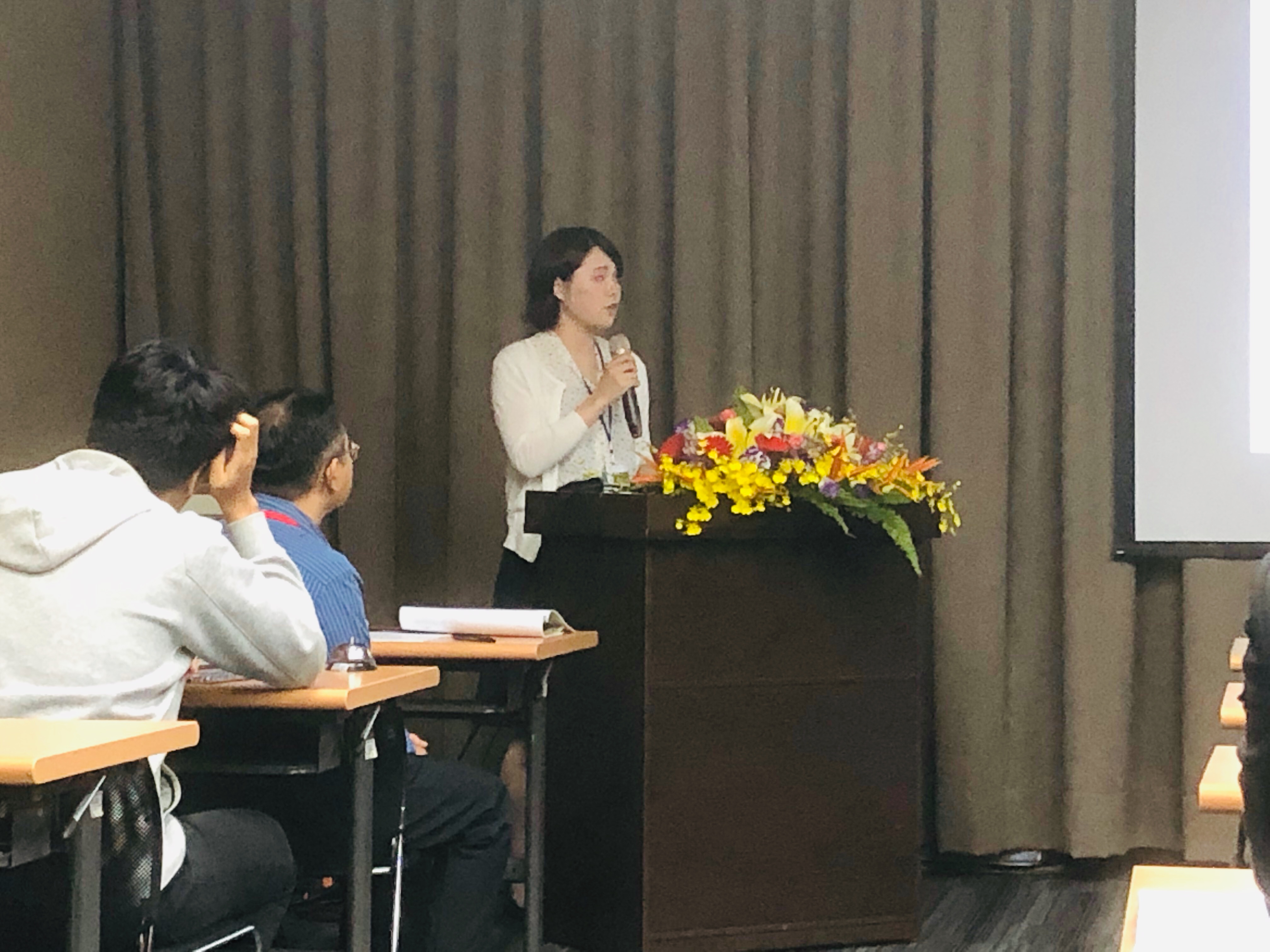FEMS 2019 (8th congress of European microbiologists)参加報告
D2 Binghui Zhou
Laboratory of Animal Products Chemistry
Department of Science of Food Function and Health
Bioscience and Biotechnology for Future Bioindustries
Graduate School of Agricultural Science, Tohoku Univesiry
I participated in FEMS 2019 (8th congress of European microbiologists)
on 7th-11th, July, which was held in Glasgow, Scotland. I also attended
a mini-symposium hosted by Professor Riitta Korpela , Faculty of Medicine,
University of Helsinki in addition to the tour at her laboratory.
As the biggest city in Scotland, the third in the United Kingdom, Glasgow
is a historic harbour city not only as a major center of Scottish Enlightenment
in the eighteenth century but also as an economic center nowadays. It was
a comfortable climate in July, the temperature was around 25℃ with lower
humidity than Japan during the day. You can find historical buildings mainly
in Glasgow Style and Victorian architecture. The apartment we lived in
this time was one of a series of the red sandstone building and it seemed
to be a typical european style of apartment in Glasgow. As walking through
the city, I was feeling staying in a huge museum because there were so
many historical train stations, ancient walls and old gorgeous restaurants.
However, along the river Clyde, modern buildings also attracted my attention.
The Scottish Exhibition Campus (SEC), in where FEMS 2019 was held, shaped
like a metal UFO with several halls and meeting rooms. Glasgow is such
a charming city with both historical and modern atmosphere.
FEMS is held in European cities every two years and congresses are the
only scientific meetings at European and international level providing
discussion between all microbiological specialties. FEMS 2019 which we,
Professor Haruki Kitazawa and postdoctoral fellow Dr. Aminul Islam, participated
in this congress, was in collaboration with Society for Applied Microbiology
(SFAM) and was a gathering of leading scientists in different fields of
microbiology, together facing some of global challenges such as antimicrobial
resistance, environment pollution and the emergence of pathogenic disease.
On welcome reception on the first night, a co-worker of Dr. Aminul happened
to attend the congress in coincidence. They talked about the research career
these years and in the future. It felt to me amazing that friends who had
not seen for many years could meet at a congress of microbiology because
of science. I gave a presentation at the poster session on the second day
of the congress. The title of my poster is “Selection of wakame assimilative
lactobacilli and in vitro evaluation of their immunomodulatory potentials”.
Although I was not worried about my English, as the first time to present
at an international congress, I became nervous when I presented in front
of strangers. However, Professor Kitazawa and Dr. Aminul kept telling me
to calm down and be relaxed because I knew most of my poster than any of
the others. Thanks to the advice and the practice, I was able to communicate
with those who were interested in my research. I presented my poster in
fluent English quite better than imagined. The main object of my research
was wakame and lactic acid bacteria and I thought that wakame was known
to everyone. Therefore, I did not prepare details about wakame. However,
I realized that apparently, no one knew wakame in Europe because most of
them who asked me questions started with “Can you tell me what is wakame?”.
Things that are normally seen in daily life in Japan or Asia, maybe unique
to the other side of the world. I wish I could have brought the real wakame
to show everyone in this time.
At the end of the poster session, there was a moment of regret that I
wanted to say more about my research, but it was an unforgettable experience
to introduce my research to the public in scientific English. It was an
opportunity to improve my Scientific English speaking ability and also,
knowledge of microbiology was broaden by attending lectures in different
field and presentation by young researchers
After FEMS 2019, Prof. Kitazawa and I attended a mini-symposium hosted
by Prof. Riitta Korpela , Faculty of Medicine, University of Helsinki .
Prof. Korpela’s lab was doing researches on lactic acid bacteria contained
in a traditional fermented dairy product Viili, which had a part overlapping
with my research. It was a great opportunity to know about the trend of
fermented products in Finland and Europe and to consider future research
on lactic acid bacteria during the symposium and warm discussions with
students after each talk. After the symposium, Prof. Ritta Korpela showed
us around her laboratory. I have learned more about a new lactobacilli
strain from the young researchers of the same generation at the mini-symposium,
which contributed to a great improvement in motivation for future research.
Last but not least, I would like to express my sincere appreciation to
all members of Suisei Nougaku Shinkoukai for the grant. It was a great
opportunity to participate in an international conference like FEMS 2019.
I will try my best to make use of this experience and work harder in my
research.
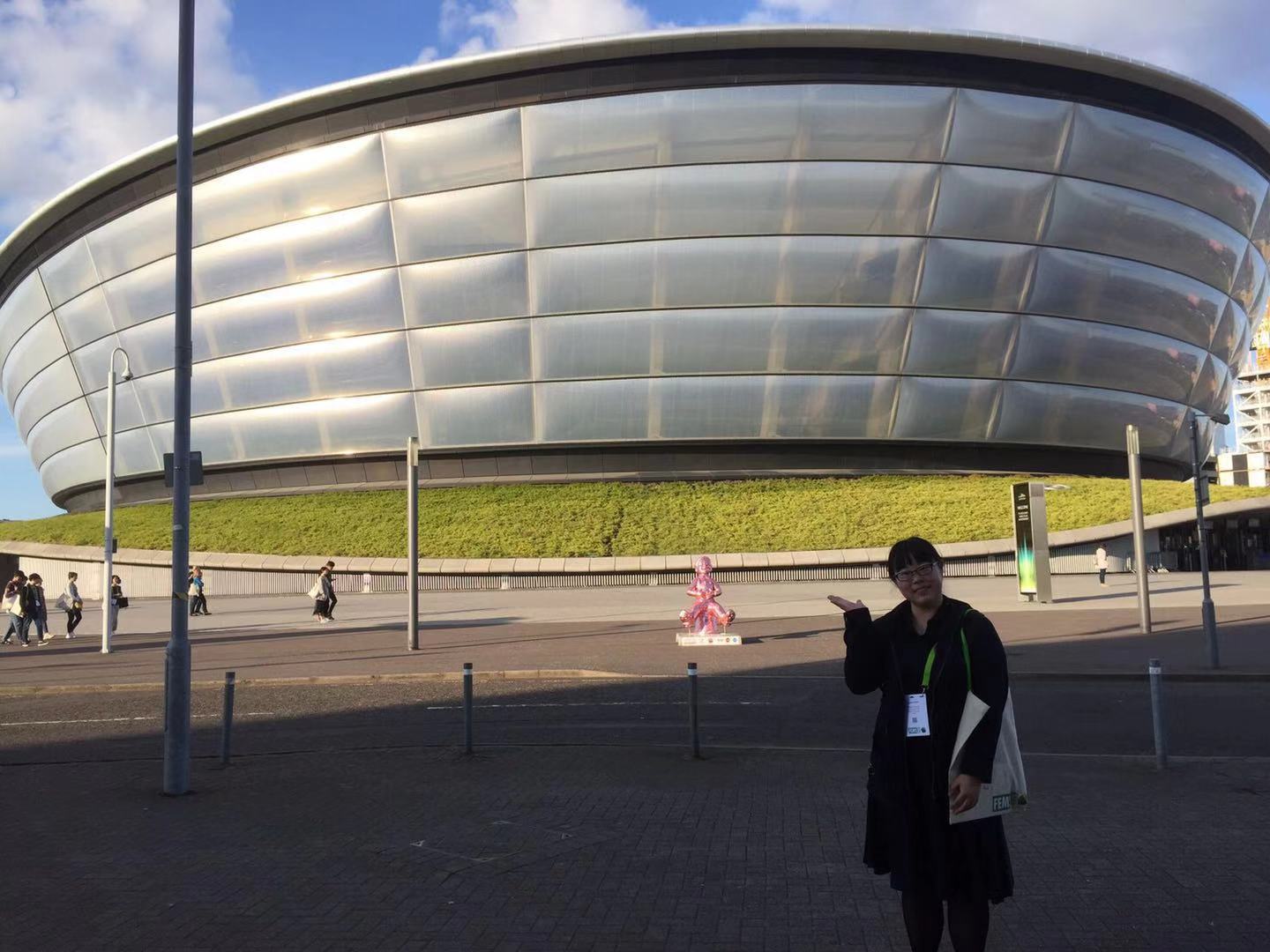
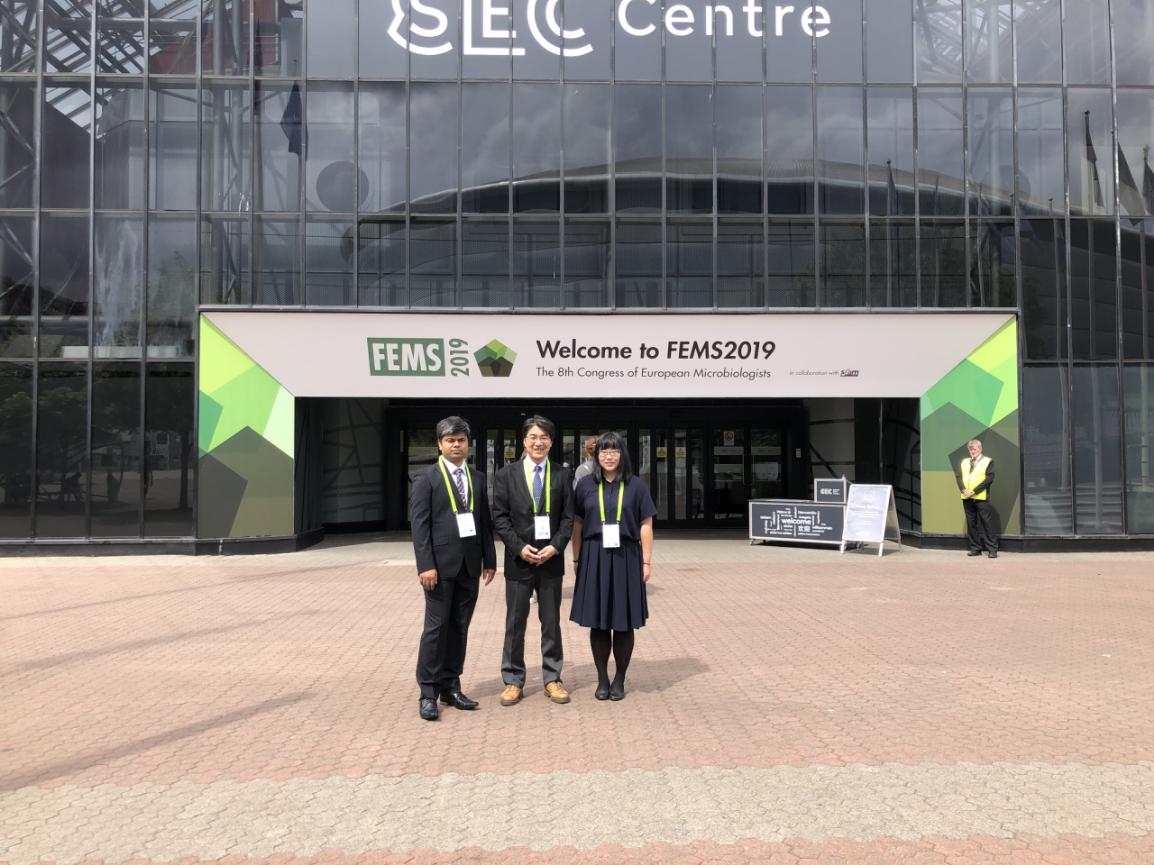
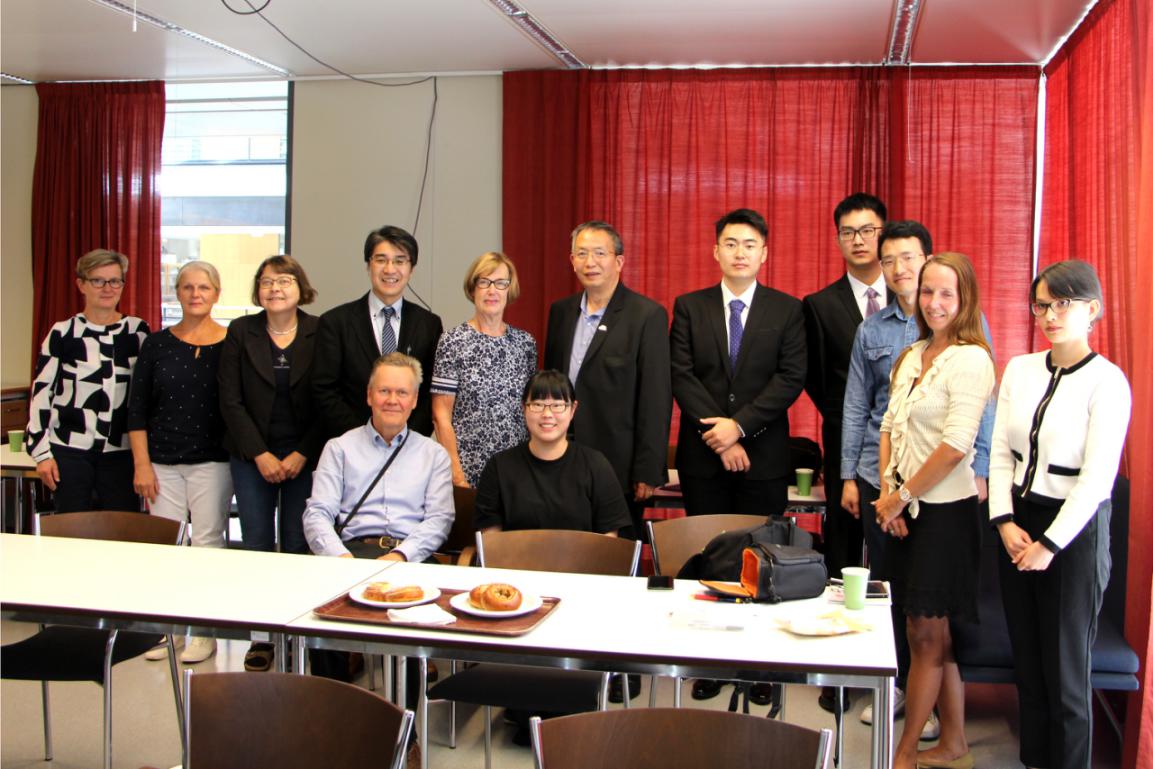
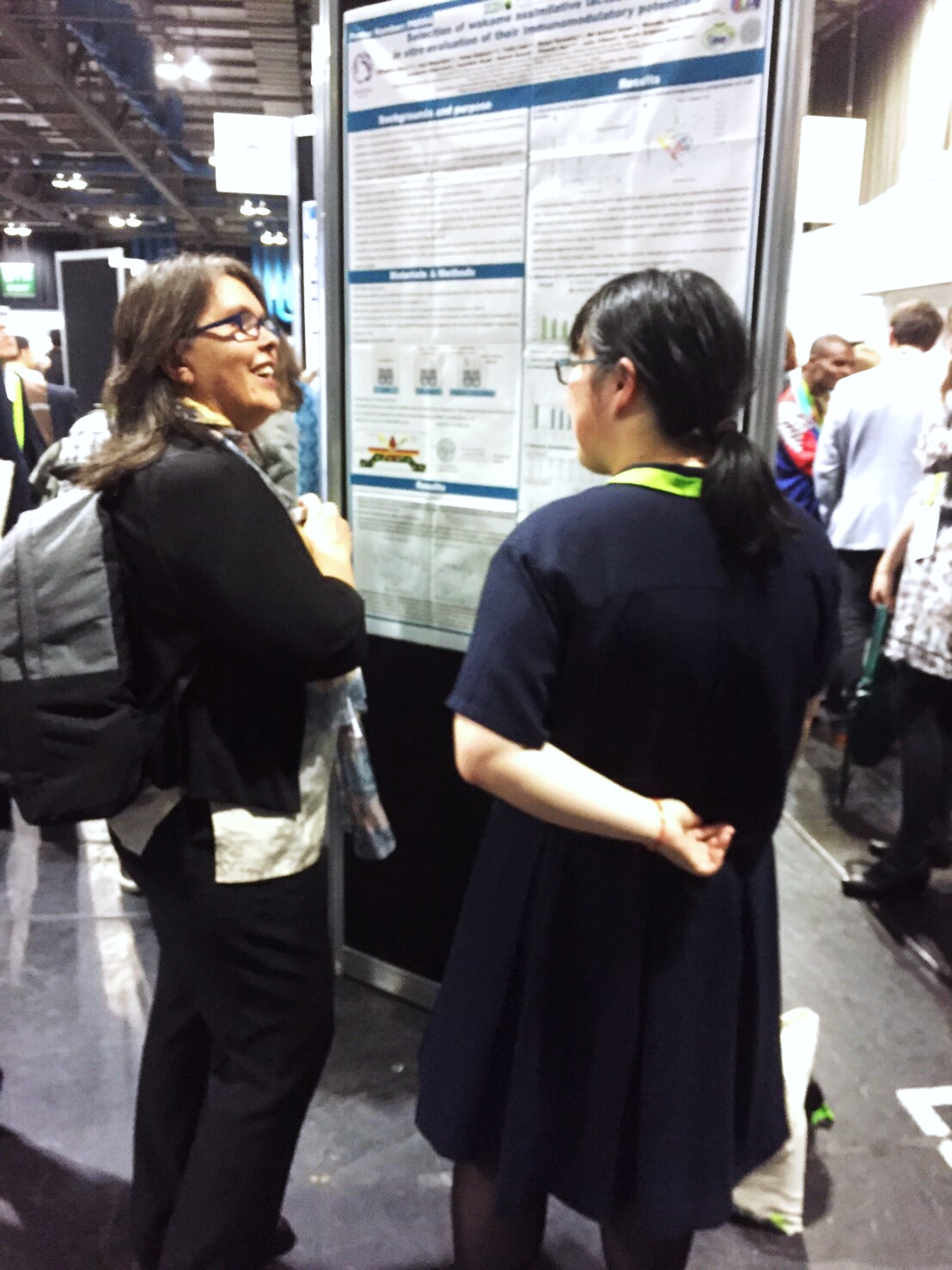
Indonesian Academic Trip (Asian Congress of Nutrition, University of Sebelas
Maret, and Bakrie University)
参加報告
D1 Wahyu Dwi Saputra
Laboratory of Nutrition
During last August 2019, I had a chance to visit my home country, Indonesia,
as a part of the academic program from the Laboratory of Nutrition, Tohoku
University. Totally, I visited three separated events or institutions including
the Asian Congress of Nutrition (ACN) 2019 in Nusa Dua, Bali, the University
of Sebelas Maret in Surakarta, and also Bakrie University in Jakarta.
I started my trip by attending the Asian Congress of Nutrition (ACN) on
August 4th-7th, 2019 in Nusa Dua, Bali, Indonesia. The ACN is the biggest
four-year meeting for nutrition-related experts throughout the Asian continent.
In the first day, August 4th, I attended the opening ceremony of ACN which
was followed by the plenary presentation by Prof. Alfredo Martinez (President
of International Union of Nutritional Society/IUNS) and Prof. Teruo Miyazawa
(President of Federation of Asian Nutrition Societies/FANS). Prof. Alfredo
Martinez gave a speech about nutrigenomics application for the precision
of nutrition assessment, while Prof. Teruo Miyazawa gave a speech about
food innovation using world-cutting edges technologies. The day after,
August 5th, I joined the company symposium sessions held by FrieslandCampina
Institute and DuPont. The topics of this symposium were about the balancing
of protein using in early and later-stage of life and also the functional
use of human milk oligosaccharides, respectively. Beside joining symposium,
I also had a chance to present my recent work in an oral presentation session.
In this meeting, I presented my work about the Vitamin K2 attenuates the
lipopolysaccharide-induced inflammation in mouse microglial cells. In the
following day, I attended the symposium held by the Japan Society of Nutrition
and Food Science (JSNFS) about elderly nutrition and nutrition management
during emergency and disaster. The speeches were given by Dr. Marthalena
Purba from Indonesia, Dr Noriko Sudo and Dr Nobuyo Kasaoka from Ochanomizu
University and National Institute of Health and Nutrition of Japan, respectively.
I completed my ACN duty by attending some oral student presentation on
the last day, August 7th.
After ACN activity, I traveled to my home town in Surakarta, Indonesia
to visit University of Sebelas Maret Surakarta. In this university, I had
a chance to speak about my work in Japan. Again, I presented my research
which had been published in the International Journal of Molecular Science
titled “Menaquinone-4 Suppresses Lipopolysaccharide-Induced Inflammation
in MG6 Mouse Microglia-Derived Cells by Inhibiting the NF-κB Signaling
Pathway”. After the presentation, Dr. Danar Praseptiangga, the head of
the department of food science and technology introduced me personally
all the laboratory work and facilities in his department. Currently, the
department of food science and technology, University of Sebelas Maret
developed a new chocolate-based product. They did several types of research
to optimize the production of chocolate but unfortunately, they still could
not analyze the product physiological effect. The department of food science
and technology, University of Sebelas Maret wish that in the near future,
they can also do a nutrigenomic experiment in order to evaluate their product
beneficial effect. Furtherly, they expected me to contribute in this collaboration
in the near future.
Before coming back to Japan, I had a chance to visit the department of
food science and technology, Bakrie University in Jakarta. In this university,
Dr. Ardiansyah, the head of the department gave me opportunity to share
my experience regarding management of research in Japanese university.
Interestingly, I did not only give speech but also received fruitful feedback
because the audiences were some young and energic lecturers. They also
shared their current work and gave their opinions about how to increase
the quality level of research among Indonesian university. It was much
interesting that we agreed to have a nice collaboration in the future so
that we can make a better and higher quality of nutrition research in Indonesia.
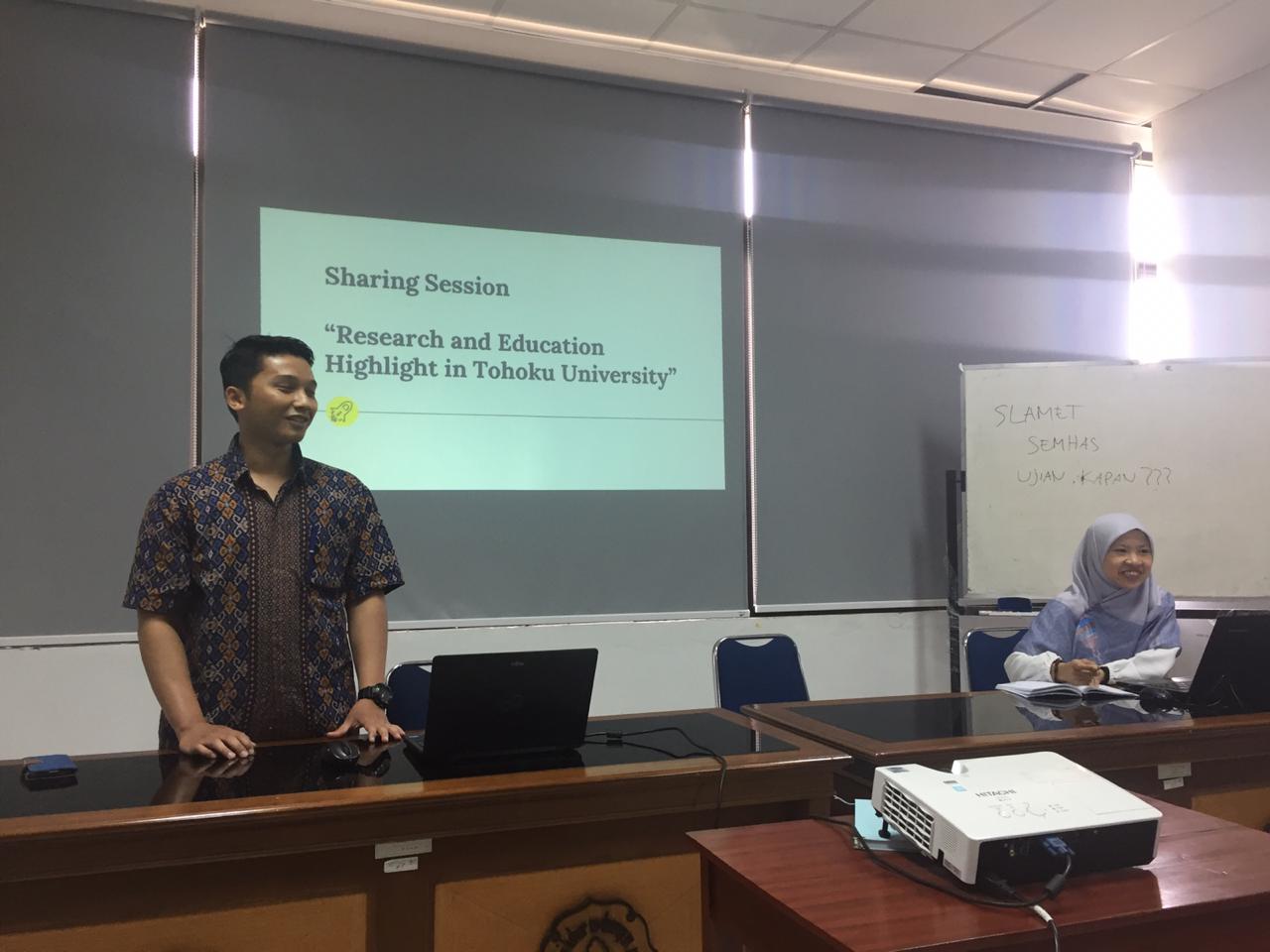

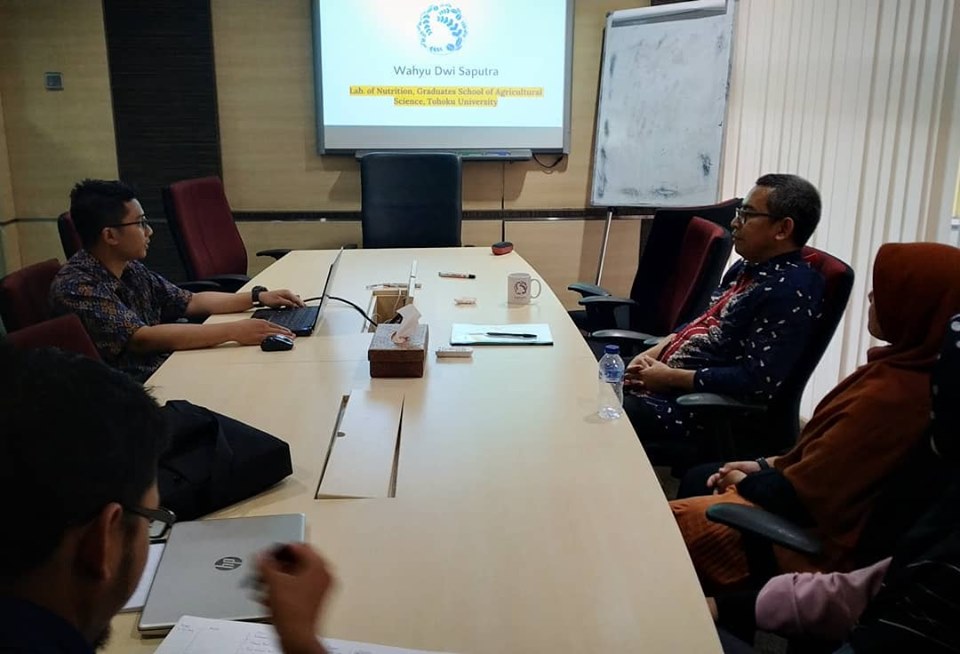
International Symposium on Ruminant Physiology参加報告
所属:東北大学大学院農学研究科
資源生物科学専攻 動物生理科学分野
学年:博士後期課程3年生
氏名:西原 昂来
私は、2019年9月3日から6日にかけてライプチヒで開催されたInternational Symposium on Ruminant Physiology(ISRP)に参加しました。通常のAnimal
Scienceの学会は、動物種は指定されることはなく、ウシ、ブタ、ニワトリなどに関する研究が同じ会場で発表されることが多いです。しかし、本学会は、ウシといった反芻動物のみに焦点を当てた珍しい学会です。そのため、反芻動物における生理学分野の学会としては、世界で最も規模のある国際学会ということが出来ます。
会場となったライプチヒは、ドイツの東部に位置するため、元は旧東ドイツに属していたためか、少し寂しい街並みでした。訪れた時の気候は、昼間は暖かいものの夜になると寒かったです。一方、バッハやメンデルスゾーンらのゆかりの地であり、音楽の街として知られています。学会期間中には、バッハの博物館に足を運ぶことができました。また、自然の状態のままで動物を飼育しているライプチヒ動物園も回ることができました。
私は、学会2日目に「ルーメン上皮細胞のToll様受容体5(Roles of Toll-like receptor 5 ligand in the
innate immune system in primary bovine rumen epithelial cells)」に関して口頭発表を行いました。国際学会で口頭発表するのは、二回目であるため、スライドを説明するのには問題がありませんでした。しかし、英語での質疑応答に非常に苦労しました。私の発表に関して、二名の方から質問があり、最初の一人からの質問には、何とか返答することができたのですが、二人目の質問を完全に理解できず、返答できませんでした。普段から英語でディスカッションする機会がなく、自身の準備不足を痛感しました。発表後に質問内容を確認すると、何となくニュアンスは合っていたので、これからは、細かいところまで聞き取れるようリスニングを鍛えたいです。また、卒業後は、海外でポスドクを経験して、英語でのディスカッションも難なく行えるようになりたいです。
学会では、反芻動物に関する発表しかなかったため、とても有意義に聴講できました。特に、カナダの研究グループの「ルーメン上皮のルーメンアシドーシスへの適応機構」に関しての発表は、私の研究とも関連のあるテーマでした。また、論文で名前を見たことがある研究者の発表を実際に目にすることができ、彼らがどのような考えでその研究を思い立ったかを知ることができました。本学会で学んだことを自身の研究に早く還元したいです。全体の発表の内容を振り返ると、日本やドイツからの研究者の発表はマニアックなものが多く、伝わりにくかったと考えました。一方で、カナダやアメリカから来た研究者の発表は、目的がはっきりしていたため、分かりやすく感じました。これからは、研究の目的を、産業面からも分かりやすくして、理解しやすい発表に努めたいと思います。
学会期間中には、韓国人と中国人のドクターと夕食を取る機会を持つことができました。彼らとは、海外でポスドクをするという共通の目的があったため、話が盛り上がりました。また、将来、お互いが教員になった時には、担当している学生を交換留学させてお互いの研究を盛り上げようという話にもなりました。この目標を実現するために、これからの研究や後輩の指導に力を入れたいです。
今回の口頭発表のため、助成金を交付して頂きました公益財団法人翠生農学振興会の皆様に厚く御礼申し上げます。今回の経験を今後の研究や研究発表、また、将来、学生を指南する立場になった時に生かし、日本の農学、畜産研究の発展に貢献したいです。

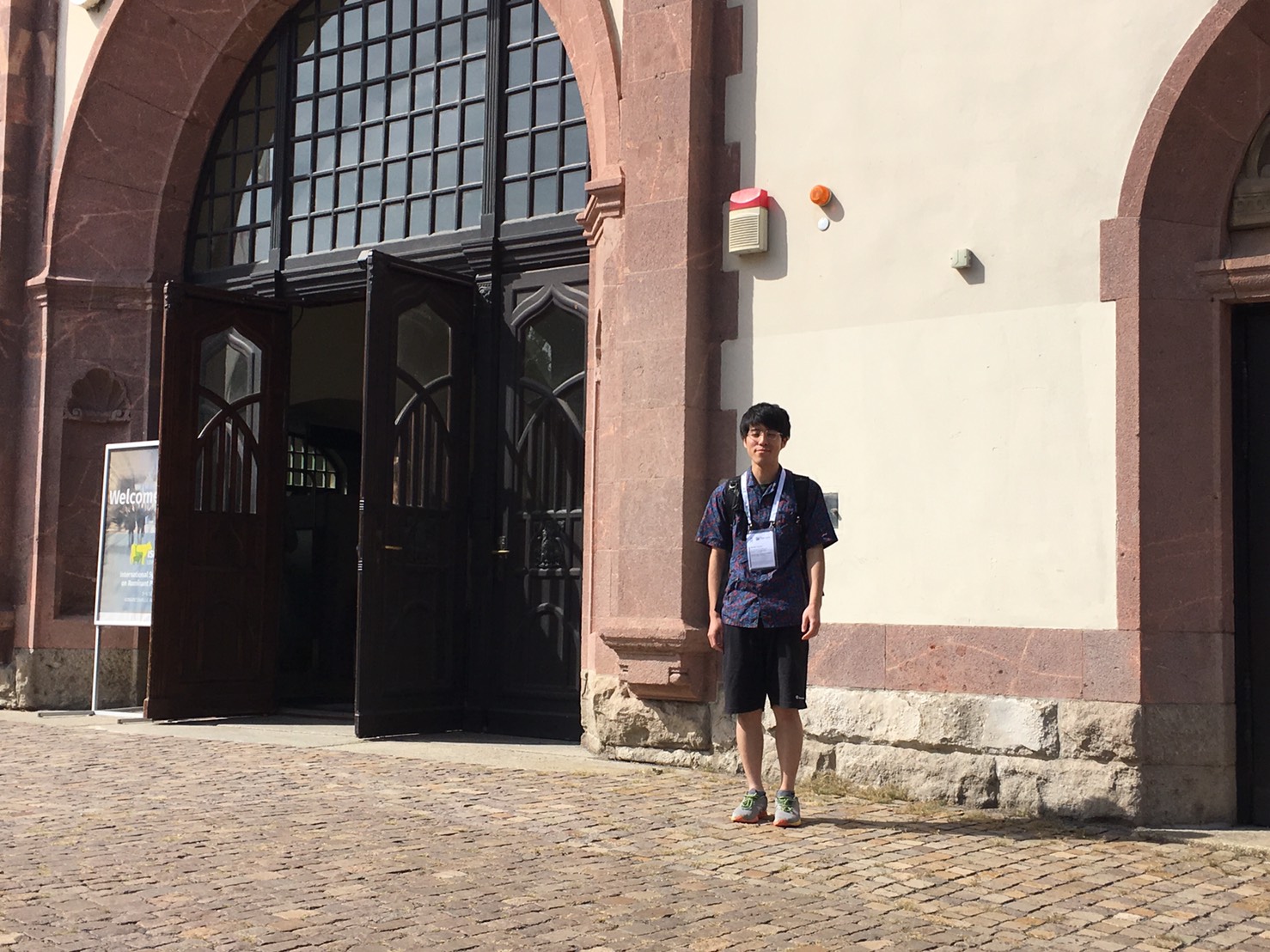
Report of research trip to Indonesia, 2nd – 27th of August 2019参加報告
Tohoku University
Graduate School of Agricultural Science
Laboratory of Nutrition
Doctor program 1st year
Afifah Zahra Agista
The trip lasted for 24 days in total. It began in 2nd of August through a flight from Narita International Airport to a connecting flight in Kuala Lumpur International Airport, and to its final destination in Ngurah Rai International Airport in Bali, Indonesia. Arrived on August 3rd at 12.05 in Denpasar, it took around 45 minutes to get to Nusa Dua, where the Asian Congress of Nutrition 2019 was held. The first day consisted of checked in, re-registration at the front desk, and confirming the schedule for the next four days. The opening ceremony, exhibition and welcoming dinner were held on the next day. However, most of the symposiums, lectures and presentations were only started on the 5th of August, the next day. On this day I attended some event including those on the theme of biochemistry, cancer & holistic-body composition, and innovations in nutrients for health and wellness. My poster presentation, on the title of “Anti-inflammatory effect of tryptophan metabolites in fermented rice bran” was held on the 6th of August. On the same day, I also attended some presentation and symposium on several topics such as early life toddler physiology-gene expression & food innovation, and approaches to control obesity in Asia. The next day, August 7th was the day for oral presentation. The presentation was titled “Potential benefits of fermented rice bran supplementation on muscle atrophy in streptozotocin-induced diabetic rats”. On top of this, I also attended lectures on the topic of prebiotics for gut microbiota support and beyond. The flight from Denpasar to Jakarta departed on the afternoon of 7th August. Since it was the beginning of a new term in the university, I attended some discussion session and attended some meetings in Bogor Agricultural University starting from the 12th of August. The discussed topics revolted around the approach and result of the fermented rice bran research that has been done in Bogor Agricultural University and in Tohoku University. We also deliberated recent research topics in the field of nutrition, functional food and ingredients, and food technology. These discussion sessions happened sporadically until Friday, 23rd of August. The flight back from Jakarta to Tokyo departed on the 26th of August, and arrived on August 27th.
Result
Throughout this chain of programs, I managed to gain some connections and insight on the recent development of the research on fermented food, amino acid and functional food in general. I also managed to learn some intervention programs that had been conducted in several areas in Asia, and the trends on functional foods and its popularity among their consumer. There were chances to see the industry point of view and recognizing several functional food products that already in circulation of the general public. Overall, I think this experience will be useful in tackling the questions and problems that might arise in my own research. It will also assists the development of new research topic in the future and ensure that the next research will be valuable to the public health and wellness.
The 10th Conference of Asia-Pacific Association of Chemical Ecologists (APACE 2019)参加報告
所属:東北大学大学院農学研究科
応用生命科学専攻 環境生命科学講座 生物制御機能学分野
学年:博士課程前期1年
氏名:中野 颯
私は貴財団の支援を受けて、2019年10月8日~13日にかけて中国、杭州で開催されたThe 10th Conference of Asia-Pacific
Association of Chemical Ecologists (APACE 2019)に参加し、ポスター発表を行いました。APACEは環太平洋地域の化学生態学を専門とする研究者を対象とした国際学会で、1997年に第1回大会が開催されてから今回で10回目の開催となります。今回の学会中には169題の口頭発表と66題のポスター発表があり、各国から300人を超える研究者が集まりました。
開催地の杭州は中国浙江省の都市で、中央部には世界遺産の西湖があり国内外から観光客が足を運びます。気候は温暖で、学会中はシャツ1枚で過ごせる日もあるほど過ごしやすい陽気でした。料理は日本人の口にもあう味付けのものが多く、日本でもなじみの深い小籠包はホテルのレストランで大人気のメニューでした。林立する摩天楼や圧倒的な人込みなど、急速な経済発展を遂げた中国の力強さを感じながら渡航期間を過ごしました。
ポスター発表では、キャベツ栽培における葉ダイコンリビングマルチを利用した害虫の抑制効果について報告を行いました。現在の作物栽培では化学農薬に偏重した病害虫防除体系を改め、適切な防除技術を矛盾なく組み合わせる総合的病害虫管理(IPM)に基づいた防除体系を構築することが望まれています。私が発表した葉ダイコンリビングマルチは、化学農薬に頼らない新たな害虫防除技術としてIPMに与する研究となります。本会は近年になってIPMに力を入れている中国での開催ということで、私と同じように新たな防除技術を試験している研究者が多数参加していました。したがって発表内ではそういった研究者の方々と専門性の高い議論を交わすことができたうえ、鋭い質問や貴重な意見をもらうことができました。英語での発表ということで、こちらが聞き取れなかったり、言葉に詰まったりすることもしばしばありました。それでも粘り強く説明を続けた結果として、たくさんの方から興味深い研究だと評価してもらうことができました。努力の甲斐あって、学会の最後にはBest
Student Poster Presentation Awardを受賞することができました。流暢に英語を喋ることができなくても、発表への姿勢や研究内容をしっかりと評価してもらえたのだと万感の思いでした。
聴講した発表の中には私の研究内容と重なるものが数題ありました。それらの発表は私の研究の課題やこれから向かうべき方向について大きなヒントを与えてくれました。そのほか、学会中に様々な国の学生たちと意見を交わし各々の研究生活や将来を語ることができました。同世代の学生とのやり取りは私自身の研究へのモチベーションを大いに刺激する絶好の機会でした。連絡先を交換した学生とはこれからも互いの研究について情報交換を行い、良き研究仲間として切磋琢磨していきたいと考えています。
私は今回が初めての海外渡航でしたが、未知の気候や風土、文化にたくさん遭遇したことで自身の固まっていた世界観に新たな視点を加えることができました。さらには世界の最前線で活躍する研究者たちの熱をこの肌で感じたことで、名状しがたい気持ちの高まりを覚えています。今回手にした様々な経験をこれからの研究生活の中にしっかりと還元し、1人の研究者として大きく成長していけるように研鑽を積んでいく決意です。最後にこの度助成金を交付いただいた公益財団法人翠生農学振興会の皆様には深くお礼申し上げます。このような素晴らしい機会を与えてくださり、誠にありがとうございました。
The 17th International Symposium on Rice Functional Genomics参加報告
所属:東北大学大学院農学研究科
応用生命科学専攻 環境適応生物工学分野
学年:博士前期課程2年生
氏名:助友 千尋
私は第2回外国派遣研究者助成金の支援によって、2019年11月3日から11月7日に台湾で開催される「The 17th International
Symposium on Rice Functional Genomics」という学会に参加してまいりました。こちらの学会は1992年から毎年開催されており、今回で17回目となっております。今回は世界24カ国から360人が集まりました。学会は3日間にわたって開催され、67の口頭発表と150のポスター発表が行われました。イネの遺伝的機能解析に関する研究をテーマごとに7つの分野に分けられており、私は「Genome
editing」という部門で発表いたしました。
台北は熱帯に位置する台湾の首都であり、訪問前は暑いのだろうと思っていたのですが現地についてみると半袖で過ごすには涼しすぎる気候で拍子抜けした思い出があります。中心部は高層ビルが立ち並び発展している様子でしたが、スクーターが多かったり、中心部から少し離れると個人経営の小さいお店しかなかったりと東南アジアのような雰囲気がありました。
私が今回の学会に参加して得た学びは大きく分けて3つあります。1つ目は、グローバルに活動し自分のこれまでの活動を伝えることに喜びや誇りを感じることができるということです。私は国内の学会で口頭発表はしたことがありましたが、国際学会に海外で参加すること、ポスター発表をすることは初めての経験でした。今回の経験で、英語を使い世界中の人に発表を紹介するという行為は学内から国内にとどまらず世界へと活動範囲が広がっていることを実感でき、研究してきた甲斐があったと実感できた瞬間でした。日常では実験室にいる場面が多くまた自身の研究について他の研究者にプレゼンをする場面が多くなかったため、自身の研究内容が他の人にどう思われているか、自分の専門性がどれくらい高まっているのかということを気にすることがあまりありませんでした。しかし、今回の学会に参加して発表し聞いてくださった研究者と意思疎通をはかっていく中で自分の研究活動や専門性は自分が思っている以上に高めてきたのだと知ることができたのはとても嬉しかったです。また、口頭発表では1対多数という関係でプレゼンをするので相手の反応が分かりにくかったりフィードバックを頂くことが困難であったりや興味を持って聞いている人だけではないと思います。一方でポスター発表では少人数での説明が可能であり、自分の研究に興味を持った研究者と話せるということからとても有意義な時間を過ごすことができました。
2つ目として世界中の有名な研究者と出会いディスカッションすることや直接話を聞くことができたのも大きな収穫でした。論文の中でしか知らない研究者が目の前に立ち、世界最先端の研究の話をしているのを聞くことはとてもワクワクしました。私の応募した分野であるゲノム編集技術における口頭発表では植物においても動物と同様に外来遺伝子を挿入せずにゲノム編集を導入することができる技術の研究が紹介されておりました。
3つ目として、同年代の学生の発表から大きな刺激を受けました。ポスターの作り方、発表の仕方から研究での悩みや将来の進路まで様々な話をしました。特に印象に残っているのは学部4年生が堂々と英語で口頭発表をしていたシーンで、あのような姿を目標に私も頑張っていこうと決心しました。
今後ですが私は修士課程をもって研究からは退き、新年度からは化学メーカーの技術営業職に就く予定です。今回の国際学会を通して、自分のこれまでの活動内容を他の人に伝えていくことに大きな喜びを感じられたことから、社内の誇れる技術を社外の人に伝えていく技術営業というは性に合っていると感じられました。このような学びが多かった貴重な機会は本助成金が無くては手にすることができなかったものです。公益財団法人翠生農学振興会の皆様に厚く御礼申し上げます


AMBS 2019 (4 th Asian Marine Biology Symposium) 参加報告
所属:東北大学大学院農学研究科
応用生命科学専攻 環境生命科学講座 生物海洋学分野
学年:博士前期課程1年生
氏名:加藤 萌子
私は、2019 年11 月4 日から6 日に台湾、台北にて開催された、AMBS 2019 (4 th Asian Marine Biology
Symposium) に参加しました。私は、この学会において、ポスター発表を行いました。
開催地の台北市は、台湾北部に位置する台湾の主要都市です。今回、私は初めての海外渡航であり、異国の空気を体感できることに心躍らせていました。台北は亜熱帯気候であり、11
月の肌寒くなってきた日本とは異なり、非常に過ごしやすい気候でした。道端に植えられている木、マンゴーやドラゴンフルーツを販売するお店からも、植生の違いが感じられました。街を散策すると、漢字ばかりの看板、多数の路上販売店が目に入り、日本と違った街並みを楽しむことができました。このように、初めての異国情緒を感じる一方で、台北には日本からの観光客も多く、商店街では、観光客の日本語と店員さんの日本語が飛び交っていたり、日本のコンビニエンスストアが多く散見されたりとなんとも不思議な感覚でした。学会のパーティーや、留学生の友人に紹介してもらったお店での中華料理は日本と違う独特な風味が感じられ、量がとても多い上、どれもとても美味しいく、異国の食文化を楽しむことができました。
AMBS は、2 年ごとにアジアの各都市で開催されており、今回で4 度目の開催でした。台湾、日本、タイ、韓国といったアジア諸国から約 200
名が参加しました。AMBS はアジアの海洋生物の研究者の研究交流を目的としており、研究対象となる生物、海域、分野 (生態学、生理学、分類学等)
が異なる研究者が一堂に会します。3 日間を通して、幅広い研究領域の発表、セッションを聞き、海洋生物・環境についてより考えを深めることができました。加えて、内容が面白い研究や、伝え方の上手なプレゼンテーション、同世代の研究者の活躍を見て、自分ももっと頑張らなくてはと刺激を受けました。また、学会全体として、アットホームで和気あいあいとした雰囲気を感じました。休憩やポスターセッション中には、おいしいお菓子をいただきつつ、パーティーやバンケットでは美味しい中華料理と現地の伝統的な歌と楽器の演奏を聴きながら、研究者の方々と交流することができました。話す内容は、アイデア交換や共同の実験計画など研究に関することだけでなく、台湾での観光や趣味についてなど多岐に及びました。私自身も、研究に関する情報を提供していただく約束を取り付けたり、他大学の学生とお互いの研究室の風習について話したりと楽しく交流しました。
私は、Seasonal change of benthic diatoms in Gamo Lagoon, Miyagi Prefecture,
northeastern Japan というタイトルでポスター発表を行いました。底生珪藻は干潟域の重要な一次生産者で、生物生産の基礎を担う生物です。しかし、その研究の煩雑さから研究例が少なくなっています。今回、その底生珪藻の個体数密度、群集組成を長期間にわたって分析したデータを発表しました。自分の発表した研究には未解明な部分、課題も多いので、他の研究者から、生物の採集方法やデータ解析方法、海洋の一般的な知識など様々な面からのアドバイスを頂きました。私は、学会発表は初めてであり、その上英語での発表であったため、数カ月前から英語の勉強をし、発表練習も何十回と繰り返して臨みました。そのため、本番では、拙い英語ではありますが、落ち着いて発表、意見交換をすることができました。
今回の学会への参加を通し、自分の研究の糧となる知識やアイデアを得ることができました。さらに、英語でのコミュニケーション能力や、研究への取り組み方、今後の課題も学ぶことができ、非常に有意義な機会となりました。最後になりましたが、学会参加にあたって、渡航費を援助してくださった公益財団法人翠生農学振興会の皆さまには厚く御礼申し上げます。今後、この経験を活かし、研究活動により真摯に取り組み、精進したいと考えています。
14th International Conference of the East and Southeast Asia Federation
of Soil Science Societies
(ESAFS 2019)参加報告
所属:東北大学大学院農学研究科
資源生物科学専攻 植物生産科学講座 土壌立地学分野
学年:博士前期課程2年生
氏名:大沼 佐保子
私は11月2日から8日にかけて開催された、14th International Conference of the East and Southeast
Asia Federation of Soil Science Societies (ESAFS 2019)に参加し、口頭発表を行いました。
ESAFSは東・東南アジア地域における土壌科学、肥料管理、植物栄養学の研究者たちのプラットフォームの役割を果たしている学会であり、今回は国立台湾大学のGIS
Convention Centerにおいて、「持続可能な農業のためのスマート土壌管理」をメインテーマに講演や口頭発表、ポスター発表が行われました。
本学会で私は、学部・修士と取り組んできた、宮城県中央部に分布する黒ボク土類縁土壌の生成と分類に関して口頭発表を行いました。具体的には、これまで土壌学には応用されてこなかったクリプトテフラ(肉眼視できない火山噴出物)識別を用いることで、黒ボク土類縁土壌の生成に関する検討に、テフラ編年学的視点を加えることができるという研究結果を発表しました。本学会が私にとって初めての国際学会への参加であり、口頭発表をする上では、土壌科学の他分野の研究者の方々に対し、自身の研究を適切に説明できるのかが懸念要素となっていました。結果としては、何とか問題なく発表を終えることができ、口頭発表の質疑応答時間や発表後には新たな視点からの質問や、今後検討すべき観点のアドバイスを頂くことができました。また、個人的に非常に感銘を受けたのが、様々な方から頂いた、「発表を聞いて興味を抱いた」、「面白い研究だ」というコメントでした。これまで、研究室内で議論を重ねる機会は多かったものの、外部の、さらには海外の研究者の方々に自分が取り組んでいる研究がどう映るのかは未知数のところで、その中で非常にポジティブな反応とアドバイスを頂くことができたことは、今後の修士論文のとりまとめや投稿論文を執筆するにあたっての大きなモチベーションにつながりました。
また、学会中には他の研究者の方々の口頭発表・ポスター発表の他、著名な研究者の方々による講演も実施されました。講演は、気候変動による影響が特に深刻であると予想される台湾において進められている、「Smart
Agriculture 4.0」と呼ばれる、持続可能な農業を実現するための土壌情報を含むブロックチェーン技術を用いた農業のIT化プロジェクトの紹介の他、「気候変動」・「持続可能な農業」をキーワードに行われました。それらを通し、日頃自分の研究テーマに没頭する中で薄れていた、農学を研究するうえでの現在や未来の環境問題や食糧問題解決への貢献という大きなテーマを改めて強く認識させられました。
最後になりましたが、今回助成金を頂戴しました公益財団法人翠生農学振興会に厚く御礼申し上げます。初めての国際学会参加の機会を頂き、今後の研究の糧となる大きな学びや気づきを得ることができました。この経験を活かし、より一層研究活動に邁進していく所存です。
